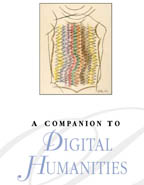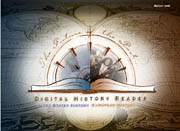
Now Online: The Companion to Digital Humanities, eds. Susan Schreibman, Ray Siemens, John Unsworth.
http://www.digitalhumanities.org/companion/
Chapters/articles on:
Part I: History
1. The History of Humanities Computing
2. Computing for Archaeologists
3. Art History
4. Classics and the Computer: An End of the History
5. Computing and the Historical Imagination
6. Lexicography
7. Linguistics Meets Exact Sciences
8. Literary Studies
9. Music
10. Multimedia
11. Performing Arts
12. “Revolution? What Revolution?” Successes and Limits of Computing Technologies in Philosophy and Religion
Part II: Principles
13. How the Computer Works
14. Classification and its Structures
15. Databases
16. Marking Texts of Many Dimensions
17. Text Encoding
18. Electronic Texts: Audiences and Purposes
19. Modeling: A Study in Words and Meanings
Part III: Applications
20. Stylistic Analysis and Authorship Studies
21. Preparation and Analysis of Linguistic Corpora
22. Electronic Scholarly Editing
23. Textual Analysis
24. Thematic Research Collections
25. Print Scholarship and Digital Resources
26. Digital Media and the Analysis of Film
27. Cognitive Stylistics and the Literary Imagination
28. Multivariant Narratives
29. Speculative Computing: Aesthetic Provocations in Humanities Computing
30. Robotic Poetics
Part IV: Production, Dissemination, Archiving
31. Designing Sustainable Projects and Publications
32. Conversion of Primary Sources
33. Text Tools
34. So the Colors Cover the Wires : Interface, Aesthetics, and Usability
35. Intermediation and its Malcontents: Validating Professionalism in the Age of Raw Dissemination
36. The Past, Present, and Future of Digital Libraries
37. Preservation
-
Archives
- March 2018
- October 2014
- September 2014
- May 2014
- January 2014
- November 2013
- April 2013
- March 2013
- January 2013
- December 2012
- November 2012
- October 2012
- April 2012
- January 2012
- June 2011
- May 2011
- February 2011
- January 2011
- November 2010
- October 2010
- September 2010
- August 2010
- July 2010
- March 2010
- May 2009
- April 2009
- March 2009
- February 2009
- January 2009
- November 2008
- October 2008
- September 2008
- August 2008
- July 2008
- June 2008
- May 2008
- April 2008
- March 2008
- January 2008
- November 2007
- October 2007
- September 2007
- August 2007
- July 2007
- June 2007
- May 2007
- April 2007
- March 2007
- February 2007
- January 2007
- December 2006
- November 2006
- October 2006
- September 2006
- August 2006
- July 2006
- June 2006
- May 2006
- April 2006
- March 2006
- February 2006
- January 2006
- December 2005
- November 2005
- October 2005
- September 2005
- August 2005
- July 2005
- June 2005
- May 2005
- April 2005
- March 2005
- February 2005
- January 2005
- December 2004
- November 2004
- October 2004
- September 2004
- August 2004
- June 2004
- August 1998
-
Meta


 N I N E S stands for a Networked Infrastructure for Nineteenth-century Electronic Scholarship, a scholarly organization in British and American nineteenth-century studies supported by a software development group assembling a suite of critical and editorial tools for digital scholarship.
N I N E S stands for a Networked Infrastructure for Nineteenth-century Electronic Scholarship, a scholarly organization in British and American nineteenth-century studies supported by a software development group assembling a suite of critical and editorial tools for digital scholarship.